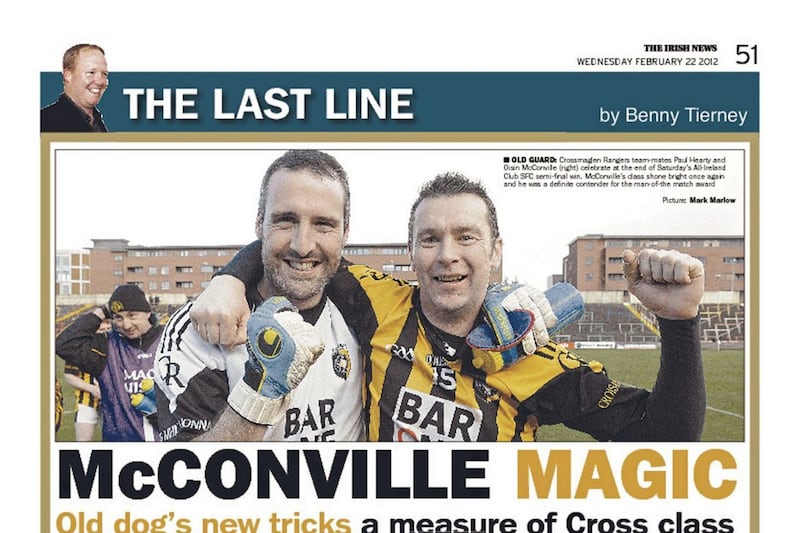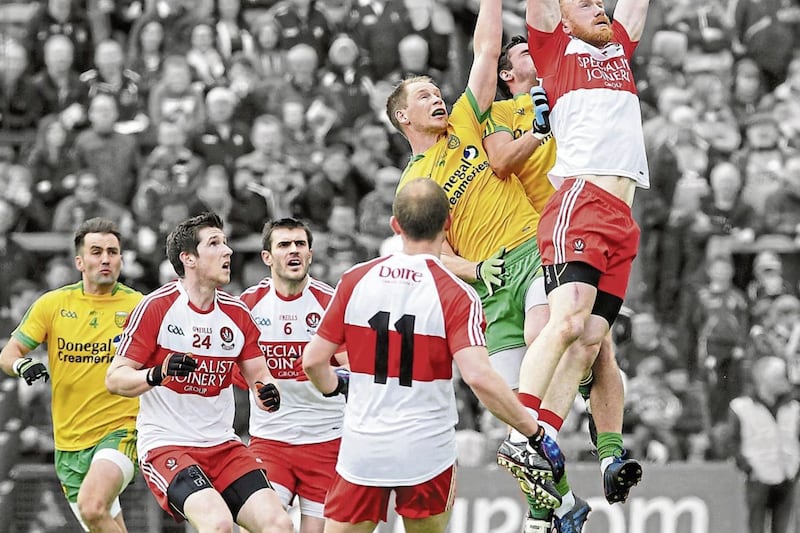AS A fledgling member of the GAA, there were fewer more exciting words in the vocabulary as the good old ‘blitz’ because this meant we were going on a magical journey with a round of ham sangwiches and a half-drunk bottle of C&C, away from our parents for the whole day to play nothing but football against equally excitable and deluded children our own age.
Even though it was only a seven-a-side blitz, the whole team would go because this was viewed as an all-inclusive day out for players and mentors where participation was the mantra that was constantly being peddled. But as a 10-year-old, the only thought going through your head was winning and possibly scoring the winning goal after probably reading too many Roy of the Rovers comics and letting the youthful imagination run wild.
You would all get togged out in nervous anticipation of who you were playing and wondering why every other team looked bigger than your side. Then your coach would call you in and announce that there would be two teams entered in the competition, but that he was splitting the talent equally so that both teams were balanced and had an equal chance of winning.
He would then call out the ‘A’ team hurriedly and you would soon realise that all the good players seem to have been mentioned. And you could sense the disappointment circulating the room when the remaining players who were not called out would then provide the basis for the dreaded ‘B’ team.
Just when you thought things couldn’t get any more depressing, you would find out that the ‘A’ team would be playing all their matches on the real football field with goalposts and crossbars while you were heading to what looked like a hayfield with two pitchforks as goalposts.
Now that might seem a tad dramatic and, truth be told, we would all have a great day and tell loads of lies when we got home about who we beat and how we played and how, honestly, I was glad I was there and playing, albeit on the ‘B’ team, rather than being left at home.
It might also sound somewhat exaggerated from my memory, but it is the first thing that springs to my mind when I hear the words ‘B’ team. Even when you grow up to play senior football the same ‘B’ team is sometimes reflective of the men who are either too old or not quite ready to play senior football yet. So, in essence, from the beginning of your career to the end, the word ‘B’ can be associated with not quite making the grade, even though it is not supposed to be the case.
Most clubs now call this team their ‘reserve’ or ‘seconds’ team – which is much more respectful and considerate to all the participants (I was one). That is why I, like many, find the GAA’s proposal to run an All-Ireland Senior ‘B’ Football Championship for the Division Four participants a little patronising and poorly thought through. I just can’t see its purpose or what it can possibly improve or achieve.
Some might say that this is a very easy opinion to have when you sit with an All-Ireland medal and Ulster Club medal in your hip pocket, but I am always at pains to add that I started my club career at second from the bottom of the fourth division in the Armagh league and at the bottom tier of the third division in the League.
I also attended a teaching college that, up until two years before I arrived, were not considered to have enough quality to play in the Sigerson Cup. Yet a few years later we won it. So like most people involved in sport, exclusion and segregation in any shape or form does not appeal to me.
You would also think that having secured your place on a county team regardless of division that you had achieved something that should be rewarded with playing football at a level that you had aspired to rather than being champions of a diluted Championship who no-one will remember in 10 years’ time.
I think I can remember only one winner of the Tommy Murphy Cup, which was this mooted competition’s equivalent a few years back, and that was Wicklow because Kevin O’Brien lifted the cup. I thought that a great player like him deserved some higher accolade from the game rather than a feeling that Wicklow had won something special.
The fact is that this ‘Championship’ is designed to give Division Four teams a more realistic aspiration of success when I feel that, in fact, it does the opposite. It would have more county players heading to America than ever before or, in dual counties, more footballers making themselves available to the hurling fraternity which has a more balanced and inclusive Championship format.
What we also seem to forget is that Wexford, who are in Division Four, knocked Down out of last year’s All-Ireland Senior Football Championship in round two of the Qualifiers with the Mourne team currently occupying a Division One berth. And can we forget that Antrim disposed of Laois in the Qualifiers, even though they are ‘leagues’ apart also.
But probably the most damning piece of evidence that this new format which has been tried twice before in other incarnations before fading away into obscurity may also fail is that the players simply don’t want it. And from what I have read from many of the participating Division Four managers, they are not only against it, but in some quarters absolutely insulted by it.
Realistically, the likes of Wicklow, Waterford and Carlow are not going to win Sam Maguire any time soon. But their names deserve to be drawn out of that pot as much as the Kerrys or Dublins of this world.
There isn’t a golfer, snooker player, dart thrower, soccer player or jockey who doesn’t believe that, on any given day, he or she and their team aren’t capable of winning the ultimate prize or pulling off the big result. And even though it may be arguably unrealistic or unachievable, to remove that hope or dizzy expectation before the competition even begins is only ever going to be detrimental. That is why I hope that the ‘B’ Championship is pulled at Congress.
“Hope lies in dreams, in imagination, and in the courage of those who dare to make dreams in to reality.”









